Dear Mr. Hajrulla Çeku, Minister of Culture, Youth, and Sports,
Dear Mr. Driton Hapçiu, Chair of the Board of the Lumbardhi Foundation,
Dear Mr. Ares Shporta, Executive Director of the Lumbardhi Foundation,
Dear Ms. Aslıhan Demirtaş, lead architect of the Lumbardhi revitalization project,
Dear Mr. Veton Nurkollari, Artistic Director of “DokuFest”,
Distinguished guests, friends of art and culture,
A beautiful river flows through the heart of the city of Prizren, one that sounds like a film reel during a projection in an old cinema.
This auditory resemblance may be one of the reasons “Lumbardhi” cinema borrowed its name from this river. But I have been told there is another reason – that this cinema resembles the river in more than just name.
Just like the river, Lumbardhi cinema documents the life of the city. The river, with its flowing waters, has given life to Prizren since its inception. And the cinema, with its cultural events, has breathed spirit into this city for 73 years. The two most important festivals—Zambaku i Prizrenit and DokuFest—began their journey in this very building. Over the years, millions of viewers have found inspiration within this space.
Dear attendees,
The story of this cinema, located in the heart of Prizren and bearing the name of the river that runs through the city, is filled with deep emotion—from the community’s emotional attachment to it, to times of rejection and neglect.
The journey of Lumbardhi cinema from its founding to today includes significant events and experiences:
• From a symbol of social and cultural reform in the mid-1950s to a gathering place and marker of collective memory;
• Through the difficult path shaped by political and economic circumstances, where it faced the threat of destructive privatization and commercial construction;
• To the triumph of civic activism and cultural and social values, when it was declared a protected cultural heritage asset, preserving its public and cultural character.
Thus, Lumbardhi cinema proved that it belongs to the community—above all, it belongs to Culture.
The case of this cinema gave rise to a festival of global proportions and sparked a civic mobilization to rescue it from oblivion and alienation.
In 2002, Lumbardhi cinema became home to the first edition of the International Documentary and Short Film Festival DokuFest—the largest international cultural event in Kosovo—reopening its doors to the public.
The decision by the Municipality in 2007 to demolish the cinema triggered civic activism: through the initiative of the organizations
DokuFest and Ec Ma Ndryshe, 8,000 signatures were gathered to stop the demolition.
Another key moment came in 2014, when the initiative expanded to include 57 non-governmental organizations from across Kosovo, united to halt the privatization process.
This made it possible to declare Lumbardhi cinema a cultural heritage asset, and to establish the “Lumbardhi” Foundation—an entity aiming to revive the cinema as an independent cultural institution, preserving its heritage values while also developing a clear vision that connects both eras and generations.
It is a special pleasure to be among the initiators who have passionately defended this institution and who today, together, celebrate this turning point—the long-awaited beginning of the full restoration and revitalization of Lumbardhi cinema.
Allow me to thank each and every one of you who has contributed along this journey, so that this cinema continues to be a cultural and civic focal point, a place of inspiration for both current and future generations.
Allow me also to thank all the various organizations not mentioned by name, which built that successful resistance of civic activism in post-war Kosovo.
In recent years, the support of the Government of the Republic of Kosovo has been essential for the development of culture and the arts—particularly in the field of cinematography. We now have the highest-ever budget for film production and support for cinemas. We have signed co-production agreements with several countries, creating additional funding opportunities for our filmmakers.
As for public cinemas in Kosovo, through the Law on Cinematography, we are establishing a legal foundation for these cinemas to grow as important spaces within our country’s cultural ecosystem.
Especially for Lumbardhi Cinema, starting next week we will begin the long-awaited process of its restoration and revitalization, with an investment of 1 million euros. This institution—this important monument of our cultural heritage—will continue for decades to come to be a home for cultural and artistic creativity, a place for workshops where both activists and artists gather, and where the values of the past meet the potential of the future.
The Republic of Kosovo remains committed to increasing support year by year for art and cultural heritage—as one of the pillars of our country’s cultural, social, and economic development.
Thank you all for your dedication, vision, and contribution thus far.
I wish you a pleasant and inspiring evening!oj mbrëmje të këndshme dhe frymëzuese!


